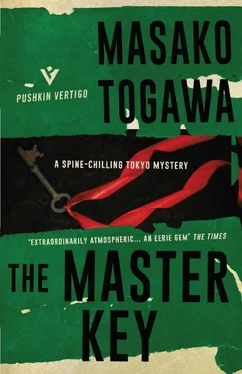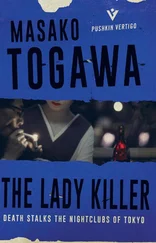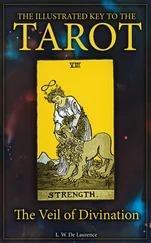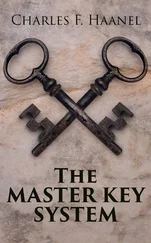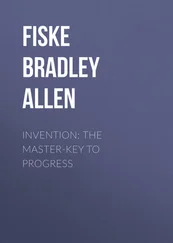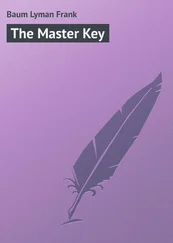She slipped out of the room; she heard someone coming up the stairways jabbering away to someone else. She quickly locked Chikako’s door and walked briskly to the stairwell. She turned around and looked behind her. She thought she saw a door close quickly further down the corridor; she thought she saw a glimmer of white hair; but she couldn’t be sure.
However, it did seem to her rather likely that it was Haru Santo she had seen, and the faint glimpse she had caught of her stayed in her mind for a long time to come.
It was clear from what she had seen that Chikako was still expecting some man to come back to her. But the real possibility of such an event had long since vanished, and only the memory of it now remained, just as fairy tale figures remain in the back of an adult’s mind. The preparations for his return had become a daily ritual for Chikako, a reminder of his past presence as real and yet as remote as the sloughed-off skin of a snake one finds by the side of a road. There was no possible interpretation other than absolute fantasy or madness.
Yoneko thought of the white linen cloth and the masculine place setting. What a way to pass one’s life! In all her days, despite her occasional hopes, Yoneko had never associated in such a way with a man, and so found it hard to imagine Chikako’s feelings.
She wrote to Keiko Kawauchi. Having explained all that had gone on and what she had seen and how she was positive from the size and colouring of the place setting that a man was involved, she went on as follows:
So you see why I am convinced that sometime in the past Miss Chikako Ueda prepared supper for some man who never turned up. I wonder what happened to prevent his coming? Did not this event change her whole life? Since then, she gave up her job as a school teacher and has remained closeted in her room. There is no record of any man having ever visited her.
And so it seems she has waited for six or seven years, laying supper for him every night. Anyone else would surely have given up hope long ago. Why does she refuse to accept the reality of the situation? It can only be because to face facts would be too painful for her. I have heard of other such cases where human beings shut their eyes to the truth in this way.
We have to believe that there was something special about her relationship with this man. We can’t be certain, but he may have been involved in George’s kidnapping, but if Chikako Ueda was, then it is a fair assumption that he was her accomplice. This bears looking into further.
She put down her pen at this point. The most significant thing she had discovered on her visit to Chikako Ueda’s room had been the poem, To a child buried on 29 March . But she still could not bring herself to inform George’s mother of this evidence which pointed to the certainty of her child’s death. Even if the evidence was even more complete, she cringed at the task. Perhaps it was better for Keiko never to know, for she had based her life on the hope of seeing her child again someday. Could she destroy Keiko’s illusions? Even if the man was the kidnapper, had Chikako been directly involved? Certainly she had loved the man, for, even though he had let her down, she had continued to wait for him all these years. Waiting for him had become the purpose of her life, just as it was with Keiko—could she, Yoneko, at one blow destroy the dreams of these two people on evidence which was still only circumstantial? Yoneko began to feel that she had meddled enough in other people’s lives already. What had begun as her curiosity about Chikako Ueda’s involvement in the kidnapping had reached a stage where Yoneko felt frightened by what she might yet discover.
And so she said no more about what she had found in Chikako’s room.
During the next few days, Yoneko could not take her mind off the vision of Chikako Ueda, plying her embroidery needle in her room as she waited for a man who did not come. People lived in a world of fantasy, she reasoned. Chikako Ueda and Keiko Kawauchi shared a similar fantasy. Yoneko felt isolated and empty at the thought that she herself had no such fantasy to give hope and point to her life. This was why her life since retirement had been so blank and meaningless as she felt it was.
Thereafter, Tomiko Iyoda called on her several times to invite her to attend meetings of the Three Spirit Faith, but Yoneko always refused. She did hear that Chikako had joined the group, but she was no longer interested in further spying on her. Perhaps, to the contrary, she was afraid that if she went to the same seance as Chikako she might find out even more about her.
It was not for another few weeks, by which time mid-April had brought clear skies and mild weather, that Yoneko changed her mind and decided to attend a seance.
After getting Yoneko’s letter, Keiko had written back urging her to pursue her researches further, particularly regarding the man who had been part of Chikako’s life. Yoneko had just put the letters to one side. What made her change her mind about attending a Three Spirit Faith seance was the so-called ‘Suwa Yatabe miracle’, which occurred during a seance at the end of March. According to Tomiko Iyoda, halfway through her trance, the medium had announced that André Dore, a famous violinist dead for some fifteen years had come in spirit form to announce that he had given his famous Guarnerius violin to Suwa Yatabe. And at this point the priest had opened the charred case to reveal within the Guarnerius restored to its former glory.
‘It was indeed a miracle. His Reverence merely touched that burned old violin, and there it was as good as new again! But as if that wasn’t enough—yes, there’s even more to come—at the same instant Miss Yatabe’s finger was mended! You know, she had visited dozens of doctors and none of them could do anything! What powers His Reverence possesses!’
Yoneko, hearing this, was inclined to think that there had been some trickery involved in the miraculous restoration of the violin, but she could not but be impressed by the story of Suwa’s finger.
The story spread, so that it was featured in an article in a monthly magazine, and soon hardly a day passed without someone in the apartment block discovering something they had lost, or some prophecy of a relative being involved in a motor accident turning out to be true, all as the result of the Three Spirit Faith seances. And then Tomiko Iyoda told Yoneko that Chikako Ueda was to have a seance to try and locate a missing friend. Yoneko could not repress her curiosity any longer.
‘Could I perhaps attend too?’
This time it was she who asked, for Tomiko had let it be known that the growing popularity of the cult had led to capacity audiences and people were having to be turned away of late. However, on this occasion, Tomiko agreed to squeeze Yoneko in as a special concession. The new rule was that to be sure of admittance you had to have attended at least four previous sessions and to make an offering on each occasion of at least one thousand yen.
Yoneko went down to Tomiko’s room a full thirty minutes early on this occasion, but there were already some six or seven people in the room when she arrived. The priest and the medium had not yet appeared, and neither had Chikako, on whose behalf the seance was being held. She sat on a cushion in the second row, next to a superior-looking woman in her mid forties who obviously came from outside. Tomiko went around the group and without showing any sign of boredom repeated the same things time and again—how the seances had proved to be of such value, how prophecies had been fulfilled, and how people’s lives had been changed thereby and so forth. Her audience were all quite prepared to agree with her, and sat nodding their heads and murmuring assent. It seemed as if this was part of the process of getting people into the right frame of mind for the seance.
Читать дальше
